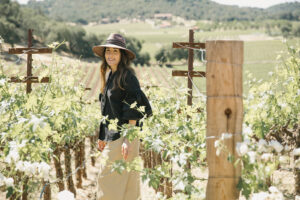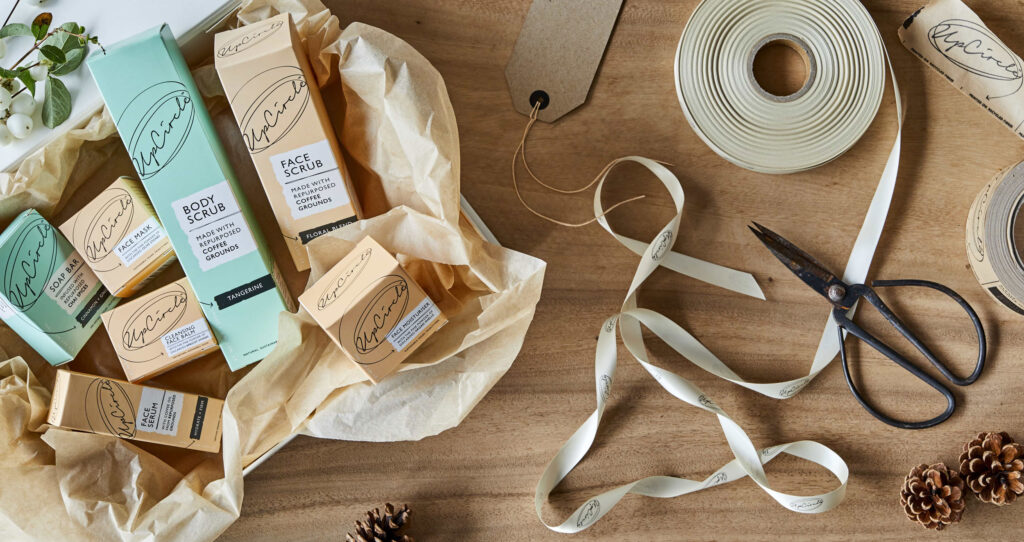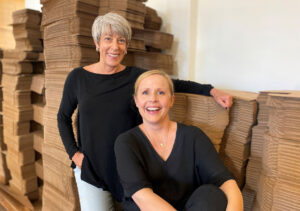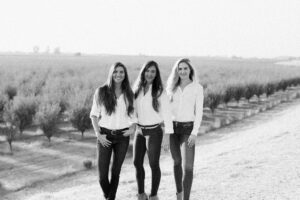
Vintner’s Daughter — Award-Winning Sustainable Skincare Brand
April Gargiulo founded the sustainable skincare brand Vintner’s Daughter on principles of efficacy and sustainability.
USA
Grace Robinson November 9, 2020
Brother-sister duo Anna and William Brightman came to the realization that their coffee grounds, along with millions of others, were going straight to the landfill. While investigating a way to salvage the discarded grounds, they discovered that coffee grounds can be beneficial for the skin. So began their journey to create UpCircle, an ethical, vegan, natural, cruelty-free skincare brand. In the beginning of their venture they began collecting coffee grounds from a nearby coffee shop in their hometown of London, England. Using these grounds and other natural ingredients, they presented their 100% natural line of scrubs to their friends and family. Quickly, the brand took off with a mission of sourcing more recycled ingredients through an official brand. Fast forward and the siblings have rescued over 250 tonnes of coffee.
How can repurposed food products benefit our skin? Anna tells us “the level of antioxidants in coffee actually increases as it’s brewed.” Acting as a natural exfoliator, coffee scrubs act to “fight free radicals which contribute to the signs of aging.” By repurposing these natural ingredients, UpCircle promotes a “circular economy,” which advocates against producing more than what is already circulating on our planet. The natural products are all mostly packed in plastic-free packaging.
Mood of Living: Where did you both grow up?
Anna Brightman : We grew up in London. We still live here now, but both of us moved away to study in different cities for university.
MoL: How has your experience been working as a brother-sister duo? Did your childhood experience influence your passion for sustainability?
AB: It’s certainly not always plain sailing! However, I actually think one of the main reasons our business works is because of how different we are. I don’t think either of us would have managed without the other! What William is good at, I am terrible at and vice versa. In short, William is the numbers man and I am the words woman. There’s no denying that working alongside a sibling is quite the experience and we’ve had our fair share of flare ups. It took us a little while to establish who would do what, but now I think we’ve nailed the balance! Dragons’ Den was the perfect example – there’s no way we would have walked out with such success if we had gone in without the other sibling!
Ingredients in products
MoL: What were your careers before starting this business together? Did it prepare you for creating a beauty brand?
AB: William and I came from fairly corporate backgrounds, but were left feeling ultimately unfulfilled. We wanted to start a business with a purpose beyond profit, a business that leaves the world better than we found it. William went straight from university into finance and I went into management roles – property management first, then into supermarket management as an area manager, managing several stores. It gave me fantastic insight into logistics, stock control, staffing and monitoring trends, but wasn’t necessarily something I could see myself doing forever. Throughout my teenage years I wanted to be a makeup artist, so I’ve always had a keen interest in cosmetics, skincare and the beauty industry as a whole. My high school originally persuaded me to go down a more traditional route, but I feel very lucky to have ended up in a job that is so well-aligned with what I truly wanted to be when I was younger.
MoL: What inspired you to create beauty products with upcycled coffee grounds? Where did this idea originate from?
AB: It all started four years ago. One morning on his way to work at his previous job, William asked his local coffee shop what they did with their waste coffee and was shocked to hear that they were producing so much that they had to pay the council to have it removed and disposed of on landfill sites.
William decided it was a great starting point for a business idea, but wasn’t sure what that idea was and that’s where I came in. I knew that coffee had loads of great skincare benefits and that was our lightbulb moment! Why not repurpose the coffee into sustainable circular skincare products? We began our journey collecting coffee grounds from one coffee shop and we now collect from hundreds of coffee houses across London – our list is always growing! Fast-forward four years and our coffee range has now rescued over 250 tonnes of coffee. Based on our current growth rates we estimate that we will have saved an additional 1000 tonnes in the next 5 years.
Manufacturing Process
MoL: What are some of the natural benefits that using coffee grounds and other food ingredients have on your skin?
AB: There’s no point in us going to all of this effort to rescue ingredients if they have no benefit for your skin. The efficacy of the products has to come first, this is always our main priority. Research has shown that the level of antioxidants in coffee actually increases as its brewed. Antioxidants fight free radicals which contribute to the signs of aging. Therefore, it can be argued that the coffee brewing process makes the coffee even better for your skin. Coffee acts as a great natural exfoliator and the caffeine helps to combat cellulite and stretch marks. The performance of the ingredients within our skincare formulations is essential. No amount of pretty packaging or clever marketing can make up for a product that doesn’t do what it’s supposed to do!
MoL: What sustainable initiatives are you implementing into your business model that are helping in the positive transformation of our world?
AB: The main thing would be that every product that we make is made from a core repurposed ingredient. We source these by-products from other industries and reimagine them as high performing skincare ingredients. In terms of broader sustainability issues, the world also has a serious problem with plastic. The beauty industry, as glamorous as it may be, is a major contributor. Billions of units of packaging are produced every year by the global cosmetics industry, bulked out by the use of complex lids, multi-layered boxes and cellophane, much of which is superfluous, non-recyclable and ends up in our landfills and oceans. The packaging across our range is 99% plastic-free and we offer plastic-free refill options for the 1%. Aside from our actual products, our marketing materials are made from paper that’s made from recycled coffee cups and we only use paper tape which has been made from recycled fibres. If we can provide competitively priced, high performing products from upcycled ingredients then we are demonstrating that the beauty industry can become a lot less wasteful – it is an innovative approach and a fresh perspective.
Anna and William Brightman
MoL: Where do you manufacture your products? Does your manufacturing process follow these same sustainable initiatives guidelines?
AB: Absolutely. All of our products are handmade within the UK. Whatever manufacturer that we work with needs to be totally behind our circular economy ethos. This is important because there has been a LOT of trial and error. We’ve faced a lot of hurdles and had to start over on numerous occasions, there have been highs, but there have also been lots of lows! The most important thing is that we kept going and found solutions that work. I think there’s definitely a reason that other brands haven’t been able to scale this concept in the way that we have – it’s not easy! We’ve worked with the same manufacturers since day one, they’ve been on the rollercoaster with us from the start.
MoL: UpCircle advocates for a “circular economy.” What is this concept and why is it so essential for maintaining a healthy planet? How does UpCircle promote this concept?
AB: This concept means finding new uses for things that are already in circulation as opposed to producing more. It extends the life-cycle of materials that already exist, preventing unnecessary waste in the process. The circular element to our brand is what makes journalists want to write about us, retailers want to stock us, and customers want to try our products and tell their friends about us! We’re shaking things up and doing things differently. Lots of skincare brands can claim to be vegan, natural, cruelty-free etc. and so can we… but we wanted to go a step further. How many brands can claim that their products have saved literally hundreds of tonnes of valuable skin-loving ingredients from ending up in landfill?

MoL: Your previous company name, Optiat, was rebranded to “UpCircle” in 2018. What led to this change, and why is UpCircle an improvement?
AB: Two years into our journey we took the decision to undergo a fairly dramatic rebrand – something that we worked on tirelessly behind the scenes for more than half a year. When we first had our idea to repurpose coffee grounds into scrubs we went from idea to launching a product very quickly. As our product ranges expanded we realized that the branding that worked for the scrubs, didn’t work for other products and our visual identity became muddled. So… we rebranded in order to unify the brand, unveiling a fresh new look and name. We took our learnings from Optiat and built on them to create UpCircle. The main challenge was keeping the existing brand running smoothly whilst all of this was also going on! The cost of it was also a challenge, but our growth has really catapulted since so we know it was the right choice to make!
MoL: How have you seen the skincare industry change since your beginning in 2015? How has UpCircle adapted to these changes?
AB: We try not to follow trends because they are fleeting and are usually aimed at ‘seducing’ a consumer. However, it is our responsibility to ensure that we are keeping ourselves informed of the latest innovations so that our products are the best that they can be! The key element of this is seeing your brand, product or business as constantly evolving – that’s very important to us here at UpCircle.
There’s been a big increase in vegan and cruelty-free products in recent years and a much bigger focus on more planet-friendly packaging too. Our concept itself is ahead of trends for the beauty industry. Our business is centered on innovation, our tagline is “Pioneering skincare. Regenerative by design.” We put the circular economy ethos front and centre in our branding, we are the only skincare brand who have centered their entire concept around the circular economy.
MoL: Has it been difficult expanding your business model globally? What challenges have you faced in doing so?
AB: There have definitely been hurdles to overcome. 2020 presented us new challenges that we could not have foreseen as the outbreak of COVID-19 meant that many industries closed down. Due to our circular economy ethos, we rely on the functioning of other industries to get the ingredients that we reuse. Having coffee shops shut for months presented supply chain issues for us, but we managed to come out the other side standing strong! We launched our products into 2000 retail doors in the UK in 2019, we’re also distributed throughout Europe and in Australia. It was a big step forwards for us when we recently launched in major beauty retailer Ulta Beauty. I think it’s worth mentioning at this point that we are a team of five, all under the age of 30!
Manufacturing process coffee scrub
MoL: What advice can you give anyone interested in starting their own business?
AB: Ironically, to not feel obliged to take onboard everyone’s advice. No one knows your business idea, your personality or your life like you do, so trust your instinct. There’s no harm in listening, but you don’t have to take everyone’s advice and run with it! Also, on a practical level, stay in your existing job for as long as possible and save, save, save. Do as much of your research and resourcing whilst still employed, you need your ducks in a row as much as you feasibly can before taking the big leap!
MoL: Since creating this business, how have your everyday lifestyles changed? Are you living more consciously? If so, how?
AB: I think this is a daily process and I try to take the approach of “every little helps.” I focus on small swaps that are easy to implement so that it never feels like a big change, just gradual improvements. I eat seasonal produce, sourced organically and locally, I cycle to and from work, I own a sewing machine and love to tailor and mend clothing, I love thrifting and vintage style, and I love revamping old furniture with a bold new paint color and for obvious reasons I know my beauty routine is as conscious as it possibly can be! When starting to live more consciously, it’s important to resist the urge to empty your cupboards and start all over again at once. There is no point in creating waste in an attempt to try to minimize waste! Use up what you have, and then next time, think about what improvements you can make in each of your purchasing decisions. Or even better, think about whether you actually need to buy each thing you’ve previously owned at all!
Photography courtesy of UpCircle

April Gargiulo founded the sustainable skincare brand Vintner’s Daughter on principles of efficacy and sustainability.

Seattle-based beauty company Kari Gran is a women-owned organic skincare brand that prioritizes sustainability.

Taking inspiration from their family farm and the superfood of Asia, the plum, the Taylor sisters cultivated a powerful cold-pressed organic plum oil, that mixes tradition with innovation to create a beauty brand.